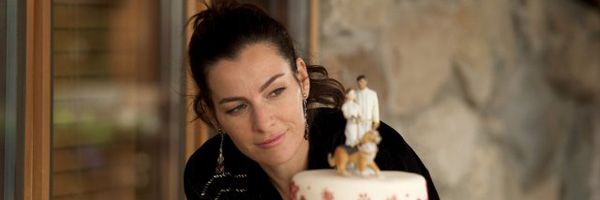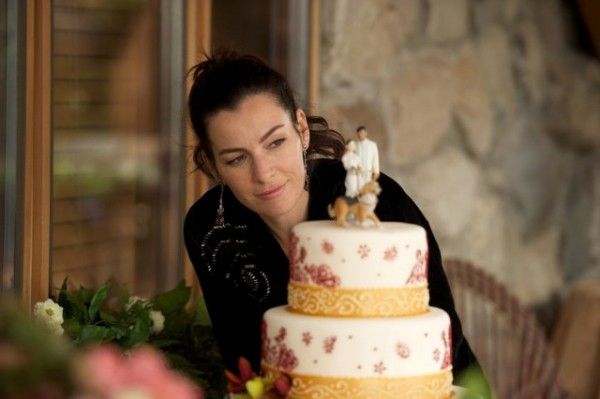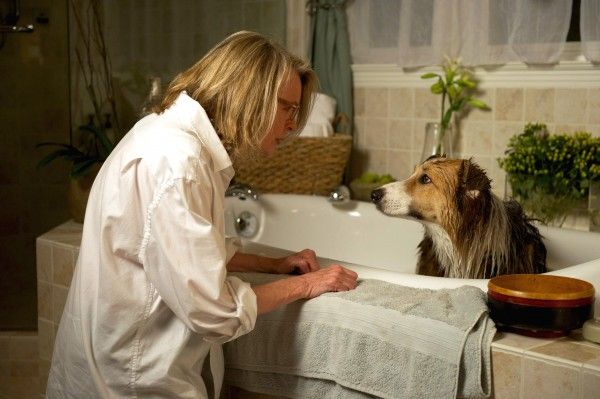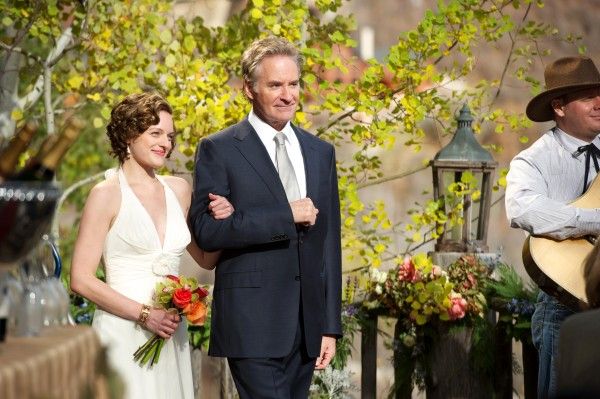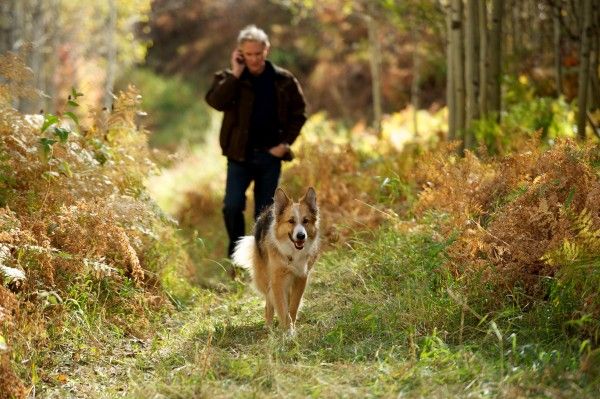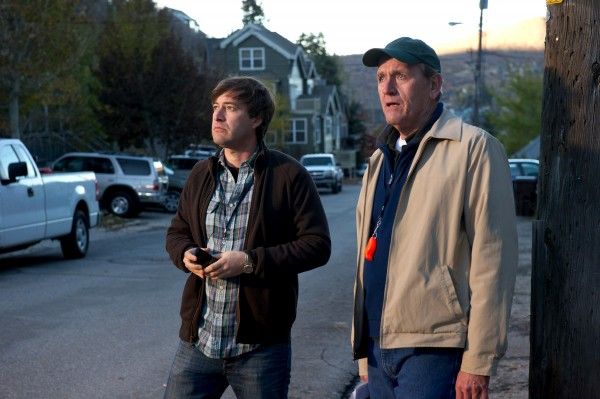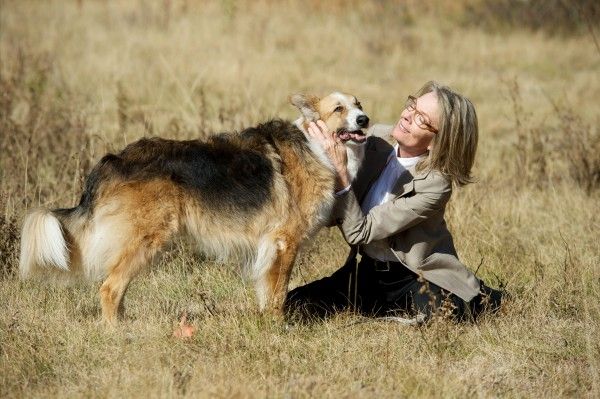In the drama Darling Companion, from director/co-writer/producer Lawrence Kasdan (Body Heat, The Big Chill, Silverado), Beth Winter (Diane Keaton) and her daughter (Elisabeth Moss) take home a dog that they find on the side of the freeway, much to the ire of her husband, Joseph (Kevin Kline). Before long, the dog, aptly named Freeway, becomes a beloved member of the family. But, when the dog bounds away into the woods after a deer, everything is thrown into crisis mode and a search party forms that ultimately ends up bringing the entire family closer together.
At the film’s press day, Collider spoke to Israeli actress Ayelet Zurer (who plays Carmen, the caretaker of the Winters’ cabin) for this exclusive interview about how she came to be a part of this film, auditioning at Lawrence and Meg Kasdan’s house, what drew her to this character, how much she enjoyed working with such an accomplished cast, and the challenge of working with dogs. She also talked about her role as Superman’s biological mother, Lara Lor-Van, in Man of Steel, what fans can expect from this version, working with director Zack Snyder, and what types of roles she’d like to do, in the future. Check out what she had to say after the jump:
Collider: How did you come to be a part of this film? Did you go through an auditioning process to play Carmen?
AYELET ZURER: I think they had been in an auditioning process, but I was out of the country on work. So, I really came in last minute. I think it was late Friday, and I went to Larry’s house. It wasn’t even a casting office. We just sat down on the sofa, and Meg [Kasdan] was there and the casting director was there and the dog was there, and we just read a bunch of times. That was it. And then, 20 minutes later, they called me and said, “Are you interested?,” and I said, “Yeah!”
Is it easier to do an audition that’s so informal?
ZURER: Yes. First of all, it’s easy because the people involved really understand that you are an actor. When you come to a room, it takes a little bit of time to communicate. It’s easier if there’s a real actor, and you’re not speaking to a casting person who has been reading the same lines the same way, the whole day. It’s a different thing. It’s so much better. You can get so much better results from your actor, if you do it that way. Everyone should do it that way. You actually play with an actor. The casting person can be the nicest person, but they’ll never be actors. It’s not like you have the real thing.
What was it about this story and this character that appealed to you?
ZURER: The fact that it was funny, I really liked that for myself. I’ve done so many dramas in the past years and I was hoping to do something lighter and funnier. Also, there was something about her and the fact that she’s so positive and fearless. That’s a nice place to be in, when you act. Meg said something very nice. Because some parts of this are based on a real story, she said that this woman is not a mind-reader, but she has more of a capacity for people’s emotions, so she feels them better. That’s a really nice thing. That’s a comfortable place to be in.
Was she always this fleshed out, on the page?
ZURER: Yeah. That’s the amazing thing about Larry. His screenplays are really precise and you don’t change a lot. There’s a table read, where everybody works on it and tests the lines and text, but they don’t actually change the lines, except for maybe Diane Keaton because she likes to fill out the spaces with her thoughts. But, that’s really it. He worked with the camera to show what Carmen is thinking. Usually, when you get a screenplay to read, with the ladies especially, it’s the same voice. You don’t feel a difference in the characters, within the lines, and you have to put it in. With the way that Meg and Larry wrote these ladies, they were very different. All the characters have their own voice, they speak differently, and they’re interested in different things. What I loved about Carmen was that she was very precise. She would say, “I see things.” She would throw this arrow, and that was it. You didn’t need more than that, and that was cool.
What was it like to walk onto set with this cast? Were you ever nervous about it, or was it intimidating, at all?
ZURER: Yes, it was. It always becomes intimidating, for me, at the exact same point, when we do the table read, and I have to listen and read, but I want to look at them, at the same time, as part of the audience. Something in me wants to see how they do whatever they do. And, I always get confused and forget my lines and forget where I am because I’m three pages away from everyone else, but I enjoy it, now more than before. When they started standing up, on the second and third day, and didn’t even sit down in a chair, and started to throw the lines in between them and move around, that’s when I went, “Wow!” The amount of confidence and flexibility was really something that made me think, “Wow, that’s a talent, and that’s something you can take from this.”
How was it to work with Mark Duplass and develop the relationship between your characters?
ZURER: We really had a very creative time together. He was working on his projects, and I always had to listen to the stories and ideas that he had. It was very nice, and it really helped our relationship within the movie. Some people knew each other. They had worked together, so they had relationships, in some ways. Definitely Larry and Kevin [Kline] have worked together. They had this quick back-and-forth relationship that was clear. The actors just bonded, naturally.
Did you enjoy shooting in such a beautiful location as this?
ZURER: This was perfect for me. First of all, it’s beautiful. Second of all, when we were actually filming, we were outside, most of the time, in these beautiful surroundings. It was just a really good experience for me. And, we had a nice hotel and always had dinners together. It was a treat. On top of that, to have this great experience and always laugh, because all of these people have a great sense of humor, it was just nice.
How challenging was it to work with the dogs? Did they mostly cooperate?
ZURER: I saw Diane Keaton working with the dog and she really impressed me. Dogs do what they need to do with the trainers, and they do it well, but when they need to do that with a person they don’t know, there’s a bit of a difference. I saw her doing a good amount of takes and never letting her energy down and really going for it, each and every time, until she’s happy. She always said, “No, give me another one. I want another one. I can do it!” It was outside, and sometimes there was sun or rain. She’s a strong lady.
You’ve done work in small productions, like this film, and in big productions, like Man of Steel, Angels & Demons and Munich. Do you prefer the style of one over the other?
ZURER: Even in the big movies, if the scenes are very big, I’m not fond of them as much as I’m fond of small actor scenes. That can happen in a big or small movie. I had them in Munich and Angels & Demons. They don’t happen a lot, but they do happen. But, [something like Darling Companion] is more fun because that’s most of it. I do tend to like movies that challenge me, professionally. That’s mostly on a smaller scale, when you have one or two or five actors, and it’s all about the acting and not the camera.
What can fans expect from this version of Superman?
ZURER: I can’t say much, but from what I’ve seen, it looks closer to the darkness of The Dark Knight. Christopher Nolan is also executive producing the movie. It has a very dark feeling to it, and less of a black and white type of Superman. It’s going to be a little edgier.
When you do something like Man of Steel, is it difficult to get out of your own head, knowing that you’re playing the biological mother of a character as iconic as Superman?
ZURER: You know, if the scenes weren’t well written and they weren’t emotional enough, I would have had a problem because you are aware of the heroic moments, but mostly I didn’t feel that way, at all. They were just really good, dramatic scenes for me.
Was most of your work down inside with a green screen, or did you have to deal with some of the outside locations and all of the paparazzi?
ZURER: I wasn’t distracted, at all. It was very quiet and very well kept. People could not bring cameras or phones into the set, so it was very work-oriented. At the end of the day, you really want one thing, which is for your scenes to work. For me, that was great.
What was Zack Snyder like, as a director? Was he much different from working with Lawrence Kasdan?
ZURER: It was the same, at the end of the day. Their approach is different, but something about their personalities was the same. They like people. They’re interested in human beings. The more interested they are in others, the more interesting their scenes become because they actually see things other than themselves. I find all of them to be sensitive people. That’s really helpful. It’s very bad if you are nervous or afraid, or you feel like your director doesn’t like you or is not happy with what you do or you don’t have good communication. They’re people with good communication skills. They have to have that. Well, at least the people I work with have had that. Maybe I’ve gotten lucky. You really want to make sure that you have fun, at the end of the day. If it’s not fun, what’s the point. Fun, even if it’s painful. Even if the dramatic scenes are really hard, if you’re happy with what you have and it’s been creative and you had a good time with the people you worked with, that’s a good day.
What initially led you to acting? Was it something you just always wanted to do?
ZURER: I didn’t think I was fit to do that. I didn’t think I had that within me, at all. I also was not exposed to it, at all. I think it started when I was in my late teens, when I started seeing theater shows and thought, “Wow, that’s such an amazing experience.” I saw a lot of dance theater that I really loved. That really made a mark on me. After that, when friends went to auditions, I always went along ‘cause I was curious. I didn’t expect it to happen, but it did, and it happened again and again and again, throughout my life. At some point, I thought, “Gosh, I really need to take this seriously.” That was after three years of drama school, where I still wasn’t quite committed to the idea of me becoming an actress ‘cause I just didn’t have enough understanding and respect for it. And then, I traveled to New York and stayed there, and I had this amazing teacher. Because of him, things shifted around. His name is George Morrison, and he created a school with Mike Nichols, who I love. I don’t know him, personally, but I know all his work. He taught me there, in a bunch of classes that I went to, and then I used that, later on, in the theater. That suddenly clicked and made sense, and it made it deeper. Suddenly, I could see into other people’s personalities, their approaches to life and the way they think. It was suddenly interesting, like a scientist or a psychologist. It was closer to something more profound. When I found that, I really, really had respect. And when I gained respect, I really wanted to do it well.
Was it scary to try to conquer Hollywood, or was it easier because you really had no idea how difficult it was?
ZURER: Yeah, I was not aware. I got Munich after I had done In Treatment in Israel, which was very successful. But, when I actually shot it, nobody knew it was going to be sold all over the world and be so successful. When I got Munich, I was actually filming In Treatment, so I went to Malta and filmed some of the movie, and then went back, and then went to New York to film some stuff. The rest of my life, I was just working. I was a working actress. And then, when the movie came out and I came here to meet a few agents, it suddenly occurred to me that there were more opportunities. That’s how it went. Only today, looking backward, I think, “Thank god, I didn’t know it was so challenging and hard.” I don’t think I would have done it, if I knew.
What do you look for now, in projects?
ZURER: If I get lucky and I can choose, I would always choose a really good story and screenplay, even if I don’t know the director. If there’s a good screenplay, there’s a chance that something good is going to happen. If you don’t have a brilliant screenplay, then you either have amazing actors who give you the chance to improve whatever is on the page, or an interesting director who has enough faith in the project that they can carry it through and get it somewhere. One of those factors needs to happen. If not, it’s sad.
Do you look at film and television for roles?
ZURER: I am looking everywhere that there’s something interesting for me. I don’t see any difference. And, I think things have changed tremendously in the last few years here. TV is the place that writers want to be. That happened in Israel as well. When you don’t have a very strong indie market going on, these talented writers want to have their voice heard, so they’ll go somewhere else, and everyone goes to TV because their voices are heard. Eventually, you end up following where there’s a good script. I did an episode on the TV show Awake, and I thought, “Wow, that’s really hard.” To do that so fast and to do that, if it’s very successful, for nine months out of the year, for a bunch of good years, that’s challenging. But, it was interesting. It’s a good show. You’d have to have a very good character, I guess.
Is there a dream role that you’d love to do?
ZURER: There are so many directors that I want to work with, but I can’t tell you that there’s one role. If I knew it, I would write it for myself. I would love to work with Woody Allen, of course, and Clint Eastwood, and so many others. I grew up watching a lot of Italian and French movies, so I want to have that ‘70s look, in my dream movie. I want that thing that’s not so much happening now, that’s existentialist.

